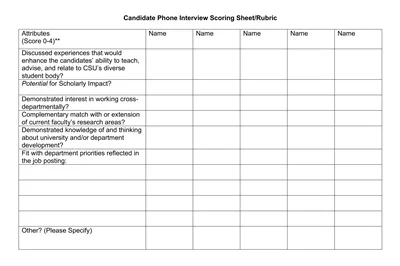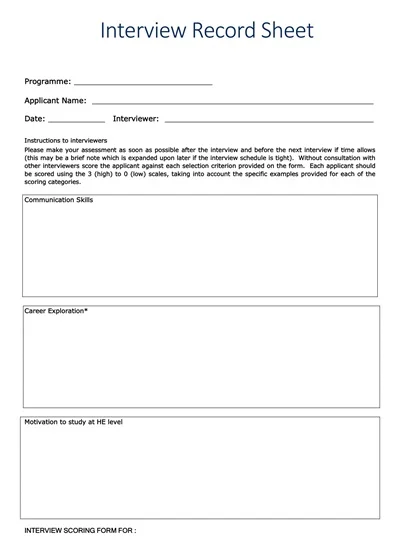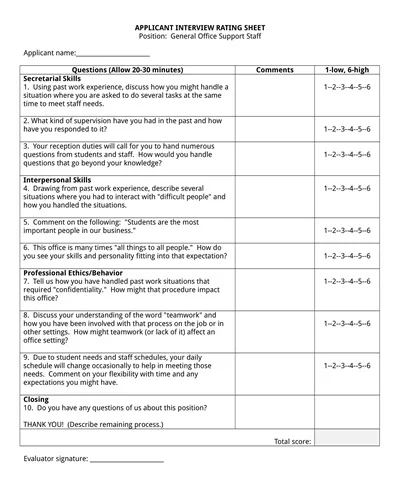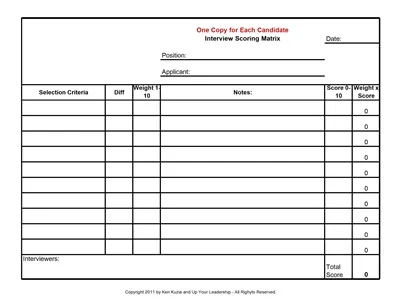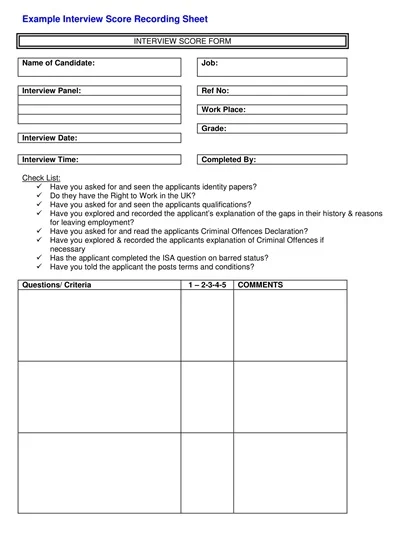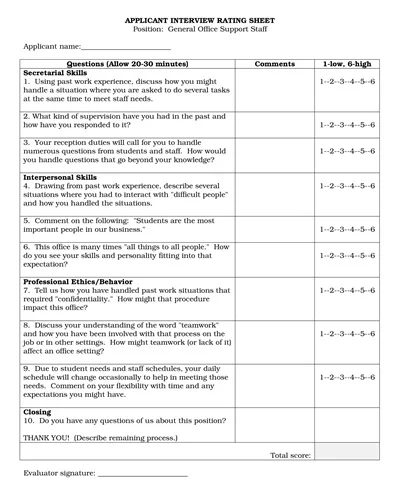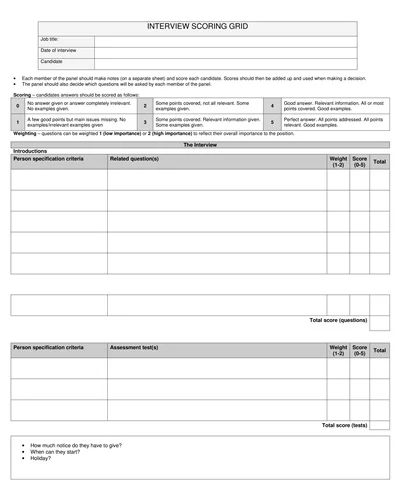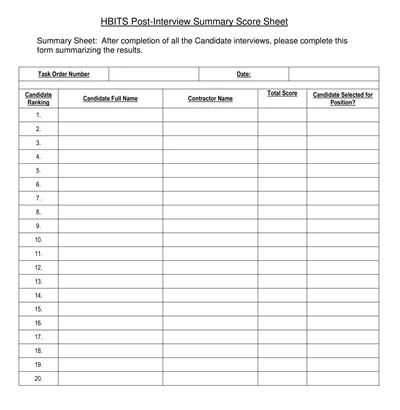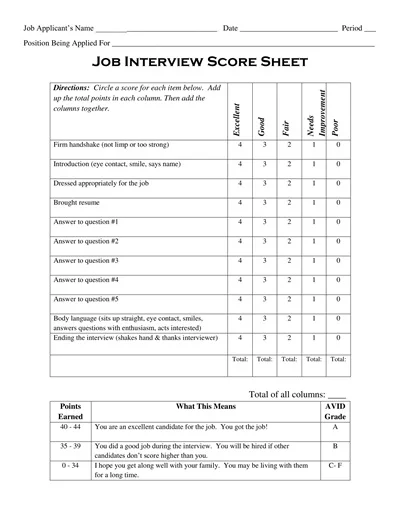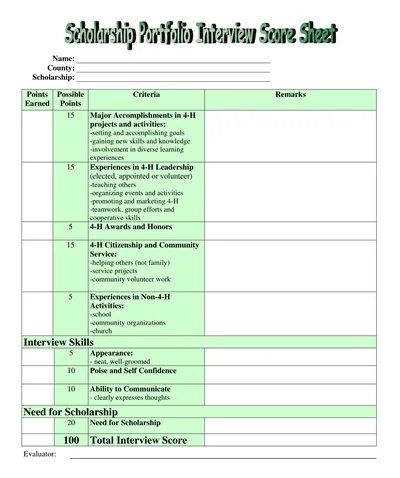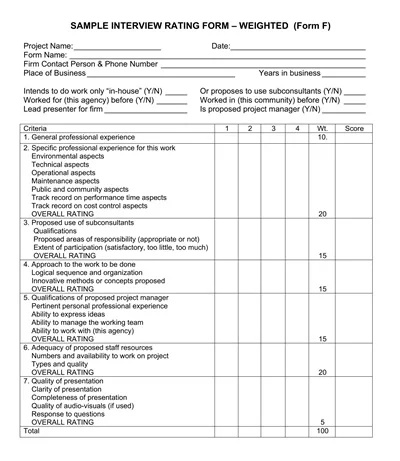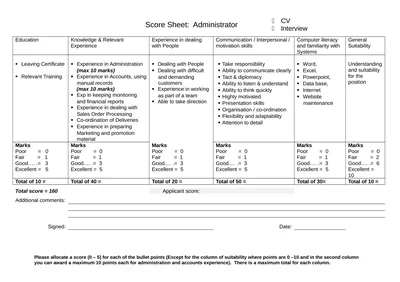22+ Free Sample Interview Score Sheet Templates
Interview Score Sheet Template is a pre-planned worksheet that is employed in assessing and evaluating the performance of the candidates who are interviewed for specific job openings. This typically includes different competencies for example skills and knowledge, experience, communication, and cultural awareness together with a rating scale to evaluate competing candidates in each criterion.
The use of Interview Score Sheet Templates is beneficial for maintaining objectivity in the evaluation process, minimizing biases, and enhancing the accuracy of hiring decisions. This use of such templates means that every candidate is evaluated in the same way using agreed standards.
Download Free Sample Interview Score Sheet Templates
What is an Interview Score Sheet?
Interview Score Sheet is a document used during interviews to compare candidates systematically and by a hiring manager or an interviewer. It often takes into account various factors that are important regarding a particular position: skills, collaboration, diversity, and initiative.
He or she gives each criterion a grade, usually on an ordinal scale, thereby enabling the interviewer to see how each interviewee measures up against the criteria. This kind of form ensures that the interviewers objectively rate candidates and also allows them to easily compare candidates and select the most suitable one for the position being offered.
Components of an Interview Score Sheet
Interview score sheets are useful documents that aid a human resource manager in comparing the strengths of different interviewees objectively.
Key components of an effective interview score sheet include:
- Candidate Information: This section consists of the applicant’s name, the title of the post for which the interview is conducted, and the date of the interview.
- Competency Categories: These are the practical talents and knowledge that are specific to the work function. Examples are technical competencies, communication competencies, competency in solving issues, and competency in working in groups.
- Rating Scale: A pre-specified ordinal number or continuous scale or numeric range. g. The most applicable tool used in this study was the ‘Likert scale, 1 to 5) which gives the interviewers a chance to evaluate each competency in a standardized manner. Descriptive labels (e. g. Ratings may be provided as descriptive categories such as Poor, Fair, Good, and Excellent which may follow numeric ratings.
- Behavioural Indicators: Specific examples of criteria or standards that illustrate concrete indicators of each competency that can be used as the basis for the assessment and familiarize interviewers with what each level of rating corresponds to.
- Comments Section: This space for the interviewers to make notes during the interview with special areas for recording their observations and impressions about what they have seen and heard from the candidate as matters of concern and feedback about the performance of the candidate during the interview.
- Overall Score and Recommendation: A section with a final summary where interviewers can compute the total grade and make an assessment of whether the job holder is suitable for the job or not.
- Interviewer Information: This includes the names and roles of the interviewers to address future accountability needs and potentially open up further follow-up questions.
How to Use an Interview Score Sheet
Developing a score sheet allows interviewers to effectively assess candidates and maintain consistency during the hiring process. Here’s a detailed guide to effectively using an interview score sheet:
1. Score Sheet Set-up
Before conducting the interview, tailor the score sheet to reflect the specific attributes and requirements essential for the given job. These can include technical skills, communication skills, problem-solving skills, fit into the culture, and any other as may be required for the position.
2. Prioritize Every Criterion
Rank the criteria using importance weights. For example, if technical skills are more important than cultural they should be given more importance in selection. This allows one to have a balanced view of the capabilities of the candidate.
3. Rate Each Criterion
The interviewers are to rate each criterion using the score sheet using a consistent scale. g. from 1 to 5 with 1 referring to poor and 5 excellent). It should be better objective and not based on personal opinions and feelings but on observable facts and behaviours.
4. Take Notes
Allow room on the score sheet for notes. Recording specific examples and responses during the interview allows for keeping the reference to the scores and remembering the particular case when talking about the candidates.
5. Determine the Total Score
Total score: Add the rating of each criterion depending on its weight. This provides a numeric measure of the candidate’s performance in general.
6. Compare Scores
Compare candidates depending on the totals provided. A higher score implies that the candidate was better suited for the job based on the pre-set criteria and requirements.
7. Review and Discuss
After the interview, compare the score sheets and discuss them, along with other interviewers, about each candidate. Compare any quantitative differences in scores to agree.
Benefits of Using an Interview Score Sheet
It is possible to identify several reasons to use the interview score sheet. Some of them include:
- Objectivity: An interview score sheet’s main advantage is that it ensures the interviewer’s impartiality by using the same set of criteria for each interviewee. This removes human subjectivity and provides a more accurate evaluation based on pre-established rules.
- Consistency: The score sheet ensures that each candidate is assessed in the same parameters. This way one can compare the applicants directly and make hiring choices easily.
- Focused Interviews: A score sheet helps the interviewer concentrate on the specific competencies and qualifications of the job in an organized manner that improves effectiveness in the interviewing process.
- Defensible Decisions: An accountable score sheet is a paper trail outlining the decision’s rationale. This is especially important if the hiring choice is ever challenged: here the HR professional can present the logic and reasoning behind the selection.
- Easier Feedback: Score sheets aid in the process of explaining to unsuccessful applicants why they failed. Detailed markings can be made on the notes or scores by the interviewers to provide constructive criticism to the candidates on areas that require improvements.
- Training Tool: Evaluation sheets are also a good learning aid for new interviewers since they outline what they should be looking for and how to assess the various aspects of the interview.
- Reduce Interviewer Fatigue: Impression management in the initial screening process is a challenging task as one has to interview several candidates. It is found that using a score sheet helps maintain the interviewers’ attentiveness keep track of things well and prevent fatigue, especially in long-term interviews.
Improving the Interview Process with Score Sheet Feedback
Using a score sheet in the interview process forms a better and fairer way of evaluating prospective candidates. The score sheet should have a structure that allows them to evaluate a candidate on criteria that have been already outlined thus eliminating any subjectivity from the evaluation process and ensuring that no aspect of the candidate’s qualifications has been omitted.
For each criterion, the relative weight can be defined which expresses its importance in the position as well as the ability of interviewers to evaluate candidates’ rates. Compared to the traditional approach of making decisions, it eases the decision-making process as well as offering a platform through which candidates receive useful feedback. Describing both favourable factors and possible improvements can enable the recruitment process to be more transparent and effective.
How to Create an Interview Score Sheet Template
Having understood the concept of structured interviews and how the interview score sheet can be used, you are now ready to learn how to build one. Below are some ways through which you can develop a score sheet for interviews.
Step 1: Determine the Core Competencies
The design of a useful interview score sheet begins with the establishment of the necessary competencies. This will depend on the particular role and the company itself but perhaps the following examples can be considered: communication skills, problem-solving skills, technical skills, and teamwork.
Step 2: Develop Scorecard Metrics
After defining the core competencies you have to identify how you are going to assess each of the aspects. A numerical scale (i.e., 1 to 5 or 1 to 10) or an alternative descriptive scale (i.e., Meets Expectations, Above Expectations, and Below Expectations) can be used. The scores must be clearly stated so that all the interviewers know how to use the score sheet.
Step 3: Develop a Rating Scheme
You may also consider rating performance across overall competencies. This may be an average of all the scores or some can weight certain competencies more important in the given job. Here is where it becomes necessary to explain how this rating system will be utilized.
Step 4: Create a Score Sheet Template
The next step is the creation of a score sheet template. One can either rely on a spreadsheet or opt for a personalized template. Remember to leave space for the candidate’s name, the post or position being interviewed for, and the date of the interview.
Step 5: Provide Questions That Are Appropriate for in Interview
Then you need to write down possible interview questions for each competency on the score sheet. These questions should be prepared in such a way that each competency is addressed and the scoring system is related to the criteria established regarding assessing the candidate’s skills.
Step 6: Train Interviewers in the use of the score sheet
All the interviewers need to be trained thoroughly on how to use the score sheet correctly. This will prove useful in providing consistency and objectivity when assessing candidates. The scoring method and meaning of ratings should be explained to everyone.
Step 7: Revisit and Edit as Well as Necessary
A score sheet template can then be used for some interviews and can later be reviewed and revised accordingly. This will help ensure that all the competencies used to evaluate the candidates, the scoring criteria, and the overall evaluation scheme will adequately address the corporate or job-related needs and reflect your company’s values.

